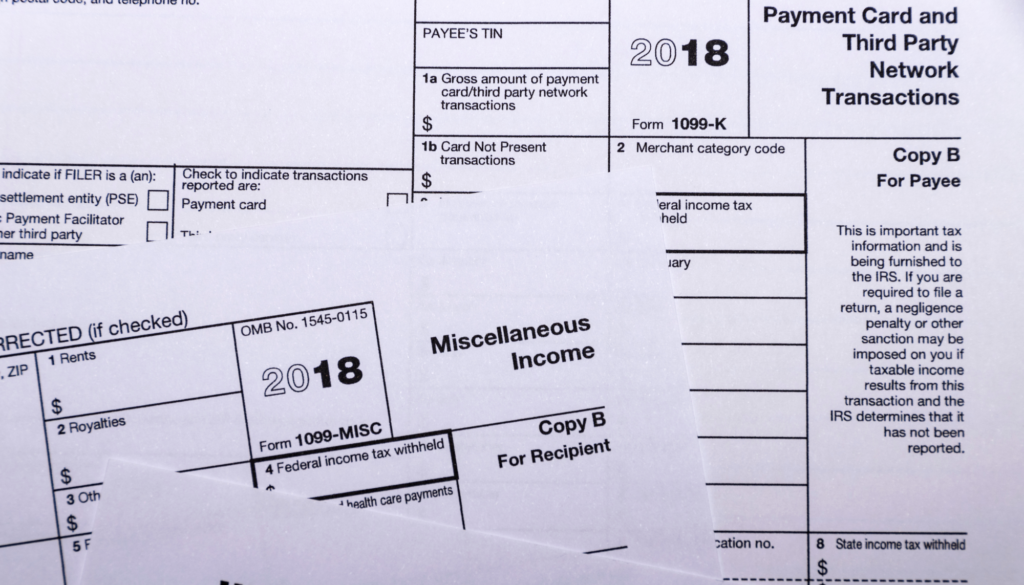What is a 1099-K? How New IRS Reporting Rules May Affect Gig Workers and Merchants

Starting in early 2023, millions of people will begin receiving 1099-K forms, many of them for the first time. Most of the recipients will be small business merchants or “gig economy” workers and independent contractors.
The reason for the influx of 1099-Ks is the American Rescue Plan Act (ARPA) of 2021, which lowered the reporting threshold for third-party networks that process payments. This means that more people will be receiving the forms—and that more income will be reported to the IRS.
What are Third-Party Settlement Organizations (TPSOs)?
According to the fine print of the legal code, a third-party settlement organization (TPSO) is a “central organization which has the contractual obligation to make payment to participating payees of third-party network transactions.” In other words, it’s a company that enables businesses and individuals to pay each other.
TSPOs include payment services such as Paypal, CashApp, Venmo, and Zelle, as well as online marketplaces such as eBay and Etsy. Gig-worker platforms such as Uber, Upwork, and TaskRabbit, and crowdfunding sites such as Kickstarter often either are TSPOs or use them to pay workers and will also be required to file 1099-Ks for payees who meet the new thresholds.
What are 1099-K forms?
There are several different 1099 forms, each used under different circumstances, but they all provide a record to you and the IRS that you received income from someone other than a regular employer, such as rental income, interest, or dividends.
The 1099-K Payment Card and Third-Party Network Transactions form is used specifically by credit card companies and TSPOs to report the payment transactions they process for retailers or other third parties. In addition to the gross amount collected for the year, the form includes the amount of money collected each month, the total number of transactions, and the amount of tax, if any, withheld.
1099-Ks must be sent to payees and the IRS by January 31 following the end of the reporting year.
What’s Changed and Why?
From 2008 through 2022, TPSOs were required to file 1099-K forms only for payees who had grossed more than $20,000 and had over 200 transactions. Relatively few payees met both these thresholds, and therefore the majority of people using these platforms did not have their payment information reported to the IRS.
Beginning in 2022, however, ARPA now requires TSPOs to report payments totaling more than $600 in a year, bringing them into line with the reporting requirements for payments made outside of TSPOs. This is most likely an attempt to increase compliance and revenue by making it more difficult for merchants and independent contractors to avoid including this income on their tax returns.
Who Gets 1099-K Forms? And How Many?
If you’ve earned at least $600 providing goods or services and been paid through a TSPO, you should get a 1099-K form in the mail early in 2023. If you’ve been paid at least $600 through multiple TSPOs, you should get a 1099-K for each.
Examples of people likely to get 1099-K forms include service providers and merchants who have accepted payments over platforms such as Square or PayPal, freelancers who have used a job platform such as Upwork, sellers who have sold products on Etsy or eBay, and drivers who have worked for rideshare or delivery companies such as Lyft or DoorDash.
What about TSPOs used for Personal Purposes?
But what if you’ve used Venmo to split a check after dinner with friends, received a wedding present of money on CashApp, or accepted donations on PayPal to pay for medical treatment? Will that be reported to the IRS as income?
In theory, 1099-K forms will not reflect money received for personal purposes. The forms only apply to goods or services, not gifts or reimbursement, and payment services usually allow users to designate payments as “personal.” Donations for personal causes are usually considered “personal gifts,” and are neither taxed as income nor tax deductible for donors (however, there may be exceptions in cases where the donations are considered “income” for the recipient; check with a qualified tax advisor if this applies to you).
Even though personal transactions shouldn’t be included on your 1099-Ks, the possibility exists that they could be added mistakenly, artificially inflating your taxable income. If you receive a 1099-K, you should check it carefully to be sure it accurately reflects your income.
What the Future Holds
Two bills in Congress could change this law again. The “Cut Red Tape for Online Sales” bill introduced by Democrats would raise the requirement threshold from $600 to $5,000. The “Stop the Nosy Obsession with Online Payments (SNOOP)” bill would reinstate the $20,000/200 transactions threshold.
Your Responsibilities
Regardless of whether you get a 1099-K—or any other type of 1099 form—it’s your responsibility to track your income from all sources and pay appropriate state and federal taxes on it. (Along those lines, if you’ve paid an individual more than $600 over the course of the year, you may need to report that income to the IRS and send the individual a 1099 MISC or NEC.)
If you’re earning non-employer income and not already making quarterly estimated tax payments on your income, it might be wise to begin doing so, both to stay on the IRS’s good side and to ensure you don’t get hit with a big tax bill at the end of the year. Please contact Tonneson + Co with any questions you may have. We can assist you to keep accurate records, comply with all tax regulations, and ensure that you make accurate and timely tax payments.
Let's Talk
If you’re interested in working with Tonneson + Co, please reach out to us. We look forward to hearing from you!
"*" indicates required fields
